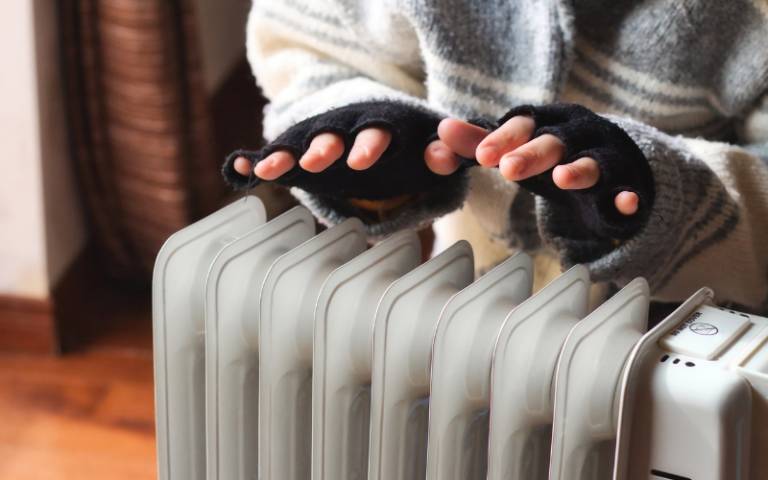The lack of meaningful action to tackle Britain's cold homes over the last decade has intensified existing inequalities - with many millions of households now at the point of crisis, finds a new report from the UCL Institute of Health Equity (UCL IHE).

Produced as a follow-up to the 2011 report, The Health Impacts of Cold Homes and Fuel Poverty*, the new analysis used data from the government's English Housing Survey and found that 9.6 million UK households are currently living in poorly insulated homes (Energy Performance Certificate D or below), with incomes below the minimum level at which an acceptable standard of living is affordable. This means having enough money to pay for decent housing, enough heating and the basic essentials of life.
Led by the UCL IHE on behalf of Friends of the Earth, the new report 'Left out in the cold: the hidden health costs of Britain's cold homes', comes just weeks after the Labour Party reduced its spending commitment to tackle the cold homes crisis, if voted in at the next election.
Meanwhile, the current government's spending pledge of £6billion over the next parliament**, falls even further short of the urgent investment needed to address the scale of the problem.
Director of the UCL IHE, Professor Sir Michael Marmot, said: "That there are millions, in a rich country like ours, living in cold homes is a national disgrace. One third of all households in the UK, 9.6 million, can't afford a decent standard of living and are in poorly insulated homes.
"Cold homes are a public health hazard: those living in them have a much higher risk of developing poor physical and mental health, which is placing an additional burden onto an already overstretched NHS and contributing to the UK's poor productivity.
"We need urgent action to address poverty, the cost of fuel and to insulate the homes of the poorest, not just because the government has a moral duty to look after the health of its population, but also, frankly, because it makes economic and environmental sense to do so."
The report highlights research that shows adults who experience prolonged cold temperatures at home double their risk of developing new mental health conditions, while the risk of exacerbating existing mental health issues triples.
Meanwhile, one in four (28%) children that live in cold homes are at risk of multiple mental health symptoms, such as anxiety and depression. Physical discomfort and negative health outcomes from the cold, financial stress, social isolation and loneliness are all thought to contribute to declining mental health.
Physical health is also negatively affected.
Professor Ian Sinha, paediatric lung consultant at Alder Hey Children's Hospital in Liverpool, said: "Whatever the outcome in children - health, education, or emotional wellbeing - cold and substandard homes are toxic risk factors. Childhood is a time when the foundations of a person's body are laid down, and that is what they are left with for the rest of their life."
Researchers estimate that cold homes are costing the UK economy tens of billions of pounds per year, as a result of costs incurred to the NHS, mental health services, care costs and the lost economic contributions of those who develop illness associated with cold homes.
The team have calculated that a national scheme to insulate low-income UK homes to a suitable standard (EPC grade C and above), would cost in the region of £74.5bn. Using regulations to ensure landlords upgrade heat-leaking homes to a suitable standard would mean that not all of this has to come from the public purse, although tax incentives would ensure costs aren't passed onto tenants as higher rents.
Such a scheme should be part of a range of measures designed to eliminate cold homes, including higher wages, financial support for those on low incomes so they can afford to pay for heating, and a national drive to build more social homes in order to reduce housing costs and improve standards.
This investment is also essential for meeting legally-binding carbon reduction targets and international climate commitments.
Mike Childs, head of science, research and policy at Friends of the Earth, said: "There's no getting away from the enormity of the cold homes crisis and the impact it's having on millions of lives. This hard-hitting report should spur all political parties into action as we head towards the general election - both the Conservatives and Labour have gone backwards over recent months on this critical issue. Given the sheer scale of the problem, we need to see transformative levels of investment and action, to stem the huge social and economic costs of cold homes and ensure our internationally agreed climate targets are met."
Testimony
Nicki Myers, aged 50, lives in Cambridge. She is a palliative care patient and disabled rights activist who is bedbound due to Ehlers-Danlos Syndrome, a genetic condition that affects the connective tissue, and pulmonary fibrosis which causes scarring and thickening of lung tissue. She said: "I'm in fuel debt, but when I tried to limit my energy use last winter I got hypothermia twice, so I don't have any option but to heat my bedroom constantly in the winter. Lots of councils have installed access equipment to reduce the number of care hours they provide, but many disabled people can't afford to use it anymore because it's too expensive to run. What's more, no funding is provided to heat the rooms that domiciliary care staff need to use.
"There are so many sick and disabled people struggling to survive winters and heatwaves in the UK because of extortionate energy bills and not enough income. The final cost of living payments are being paid this month - I do not know what disabled people will do without them. I have no doubt that some of us will join the thousands who die every year from living in a cold home."






